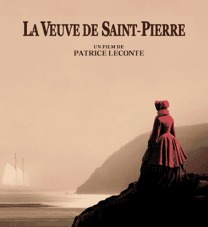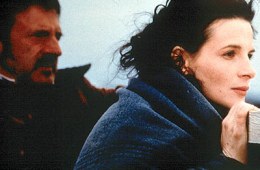The Widow of Saint-Pierre
aka La Veuve de Saint-Pierre
|
| |
 |
French language. Canada/France, 2000. Rated R. 112 minutes.
Cast: Juliette
Binoche, Daniel Auteuil, Emir Kusturica, Michel Duchaussoy, Philippe Magnan,
Christian Charmetant, Philippe Du Janerand, Reynald Bouchard, Ghyslain
Tremblay, Marc Béland
Writer: Claude Faraldo
Music: Pascal Estève
Cinematographer: Eduardo Serra
Producers: Frédéric Brillion, Gilles Legrand
Director: Patrice Leconte
LINKS
|
 ou
do the right thing because it is right, but if you do something wrong, can you
be forgiven? If that wrong deed is murder, should you be given the chance at
rehabilitation? Is there goodness in every man? The Widow of St. Pierre
asks these questions and Madame La (Juliette Binoche) believes the answers are
yes.
ou
do the right thing because it is right, but if you do something wrong, can you
be forgiven? If that wrong deed is murder, should you be given the chance at
rehabilitation? Is there goodness in every man? The Widow of St. Pierre
asks these questions and Madame La (Juliette Binoche) believes the answers are
yes.
On the remote island of Saint-Pierre off the coast of Newfoundland in 1849,
two seamen are tried and convicted for the (sort of accidental) murder of their
captain. One is sentenced to life in prison and the other to death. Since the
island is so remote, they do not have a guillotine, the sanctioned method of
execution, and they must wait for one to be delivered.
Neel Auguste (Yugoslavian director Emir Kusturica in his acting debut), the
convict, is placed in the custody of the local Capitaine (Daniel Auteuil). Le
Capitaine's wife, Madame La, believes that people are not all good or bad and
thinks she can rehabilitate the doomed man. She puts him to work building a
greenhouse so she might have a garden on the cold barren island. With this progressive
approach, Auguste slowly becomes a contributing member of the community, and
the locals begin to trust him. However, the island governor and officials are
not so sure allowing a convicted murderer to wander freely is the example of
justice they want to set. They continue with plans to acquire a guillotine and
an executioner, while Le Capitaine and Madame La struggle to keep Auguste alive.
While The Widow of St. Pierre, based on actual events, raises the question
of capital punishment versus rehabilitation, it is also a love story between
Binoche and Auteuil who are magnetic as husband and wife–their devotion to each
other jumps off the screen. As one of the upper-class ladies notes at a tea,
he devours her with his eyes from across the room. Clearly, their husbands are
not so magnanimous towards Le Capitaine and his wife. There are hints that Le
Capitaine has had some problems in Paris that may have led to his being stationed
in Saint-Pierre, and that Madame La has married beneath her station. These points,
while not belabored, add a kind of dignity to the couple.
Filmed on location in Nova Scotia, Quebec, and Paris, director Patrice Leconte
(Monsieur Hire, Ridicule) and cinematographer Eduardo Serra (Unbreakable,
The Wings of the Dove), capture the frigid isolation
of the fishing town. Scenes of Madame La and Auguste crossing the frozen ocean
are beautifully stark, and the cold is palpable.
It's been said that the French are realists and Americans are optimists. If
that holds true in their filmmaking styles, then one wonders what Hollywood
would have done to the spirit–not to mention the ending–of The Widow of Saint-Pierre.
Most likely, they would have added sex to the relationship between Madame La
and Auguste, and changed the fate of at least two of the characters, thus destroying
the grace and nobility of Madame La, her husband and Auguste. As it plays in
this film, though, their honesty and belief in doing what is right gives the
film's climax its poignancy.
Review © March 2001 by AboutFilm.Com
and the author.
Images © 2000 Lions Gate Films. All Rights Reserved.


